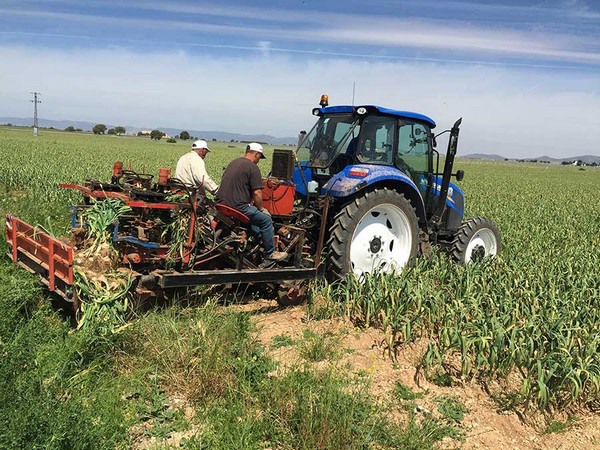Every year, with the start of the garlic harvest, the sector generates around 1,500,000 daily working shifts across Spain, which makes it a “social crop” that generates rural employment in less industrialized areas and stimulates the economic activity of many counties.
The main garlic production area in Spain is Castile-La Mancha, which currently has some 19,292 hectares under cultivation, followed by Andalusia, with 4,838 hectares, Castile-Leon, with 1,786 hectares, Madrid, with 872 hectares, and Extremadura, with approximately 500 hectares.

The wages for harvesting garlic are laid down in provincial employment contracts resulting from negotiations between representatives of the growers and workers. In most cases, a price is set per 20 kg box. Often the final pay is slightly higher than what is stated in the collective labor agreement, depending on the type of garlic, its size, or exceptional circumstances, such as the Covid-19 crisis.
This system is preferred by both growers, who only pay for what is actually harvested, and by the harvest workers. In 2019, for example, seasonal workers earned an average of € 68.20 / day, which is a lot higher than the interprofessional minimum wage (€ 48.19 / day).
The garlic harvest is very important for the generation of horticultural employment in the regions concerned. For several years, the harvesting work has been subject to strict controls by the labor inspectorate and the security services, given the great number of people employed. Very few infringements have been detected in the inspections already carried out, affecting less than 1% of the total number of employees.
Garlic growers constantly make sure that the working conditions are optimal, especially given the current situation. The necessary personal protective equipment is made available, the workers receive training on how to deal with the new situation at work and extreme precautions are taken while the tasks are carried out.
 For more information:
For more information:
National Association of Garlic Producers and Marketers, ANPCA
Plaza Arrabal del Coso, s/n. Aptdo 66.
16660 Las Pedroñeras, Cuenca. Spain
Tel.: +34 967 16 10 11
info@anpca.es
www.anpca.es
